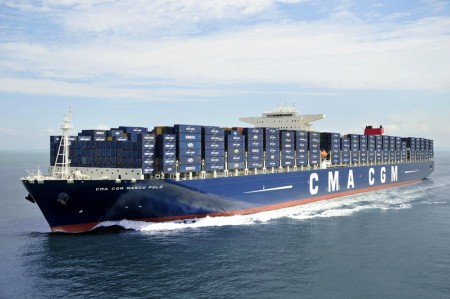Shipping company CMA CGM chooses LNG to fuel its biggest ships
The CMA CGM Group announced its decision to equip its nine future ships of 22,000 Twenty-foot Equivalent Unit (TEUs), delivered in 2020, with engines using LNG.
 |
| Photo courtesy of CMA CGM. |
CMA CGM is becoming the first shipping company in the world to equip giant containerships with this type of motorization, thus pursuing its firm commitment to the protection of the environment and to ocean conservation.
The use of LNG is a real technological breakthrough that will yield significant benefits compared to heavy fuel oil:
- Up to 25% less CO2
- 99% less sulfur emissions
- 99% less fine particles
- 85% less nitrogen oxides emissions
Moreover, the Energy Efficiency Design Index (EEDI), which measures a ship’s environmental footprint, is improved by 20% compared to ships only propelled by fuel oil.
These containerships will be LNG-powered—a few percent of marine gas oil will only be used for the ignition in the combustion chamber.
GTT has been chosen by the shipyard Hudong-Zhonghua Shipbuilding (Group) Co. Ltd., member of China State Shipbuilding Corporation conglomerate, and by shipowner CMA CGM for the design of cryogenic tanks for the nine LNG-fuelled container ships. Of these nine units, the membrane tanks will be built by Hudong-Zhonghua, who will also be in charge of building five vessels, Shanghai Waigaoqiao Shipbuilding Co., Ltd. building the other four. The deliveries of the nine vessels will take place between the end of 2019 and the end of 2020.
GTT will design the LNG fuel tanks, which represent a capacity of 18,600 m3 per ship. The membrane insulation system Mark III developed by GTT has been chosen for its space optimization allowing a maximum usage of cargo capacity.
By choosing LNG, the CMA CGM Group goes beyond current and future regulations that limit the sulfur cap to 0.5% in 2020. The Group is also fully in line with the Paris Agreement and the ongoing discussions at the international level.
Between 2005 and 2015, the Group has reduced its CO2 emissions per container transported per kilometer by 50% and has set up an ambitious plan to further reduce its CO2 emissions by 30% between 2015 and 2025.

- RWE strengthens partnerships with ADNOC and Masdar to enhance energy security in Germany and Europe
- TotalEnergies and Mozambique announce the full restart of the $20-B Mozambique LNG project
- Venture Global wins LNG arbitration case brought by Spain's Repsol
- KBR awarded FEED for Coastal Bend LNG project
- Norway pipeline gas export down 2.3% in 2025, seen steady this year



Comments